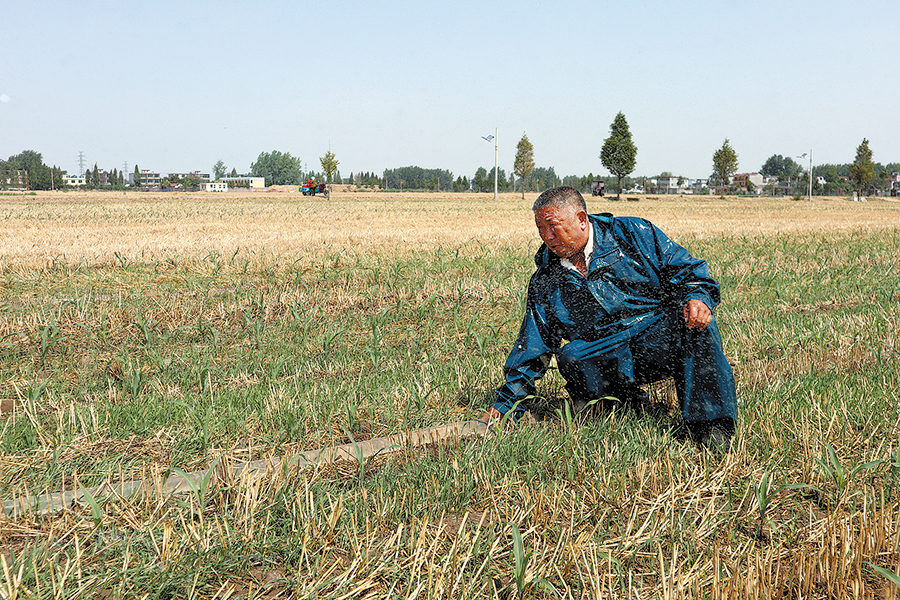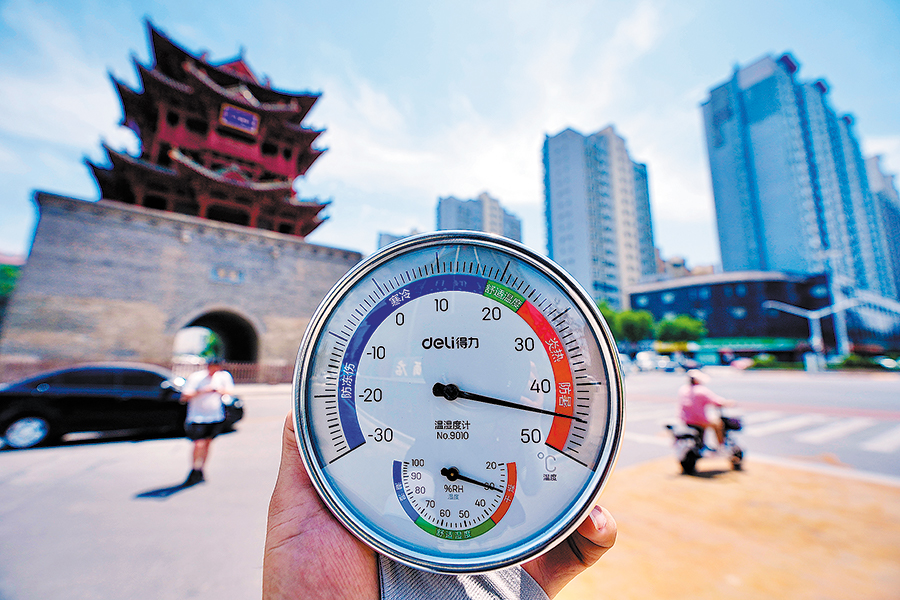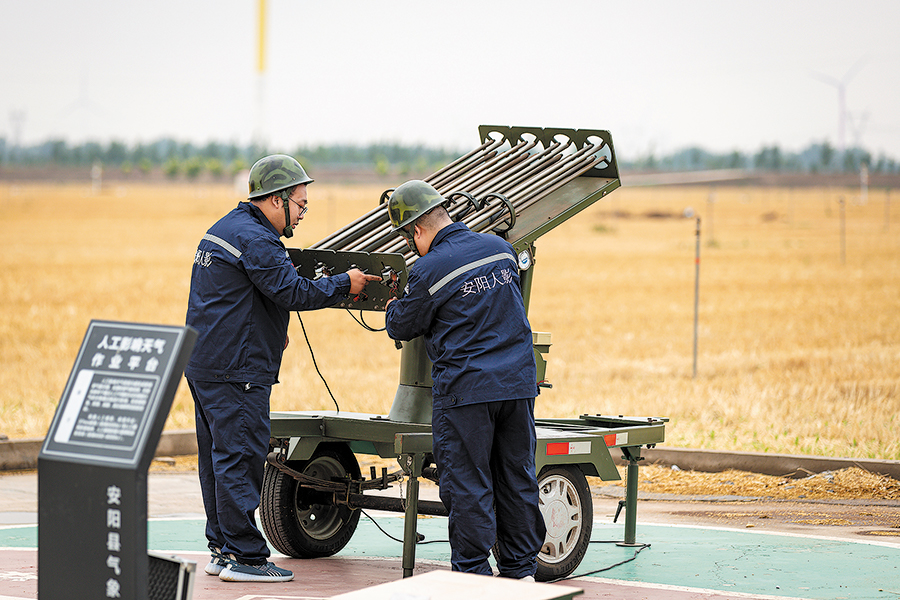
As the temperature gauge hit 38 C in Linquan county, Anhui province, on Friday afternoon, farmer Guo Qinliang was more worried about his crops than the scorching heat.
"I don't really fear the heat wave, but I do worry a lot about the continuing drought," said Guo, from Liuda village in Yangqiao township.
Guo, in his 60s, had arrived at his cornfield before 4 am, planning to finish a third round of irrigation as quickly as possible with water from the village's drought relief wells.
ALSO READ: Heat in capital leads to heatstrokes
Liu Zigui, Party chief of Liuda village, said, "The last time it rained was on May 23."
After the rain, asking migrant workers to return home to harvest the wheat crop was trending on Chinese social media platforms. "At the beginning, we were happy to see it was remaining sunny as it was good for wheat harvesting," Liu said.

Harvesting the village's 4,300 mu (287 hectares) of wheat began on May 27 and was finished in about a week.
However, planting the next crop was a major problem, as the farmers realized the soil was too dry and hard for planting corn, Liu said.
Swift to act
As large areas of China have sweltered under a heat wave in recent weeks, farming communities across the country are dealing with severe drought conditions.
The State Flood Control and Drought Relief Headquarters has maintained a Level 4 emergency response to the drought spell in the Inner Mongolia autonomous region and Hebei, Shandong and Henan, Xinhua News Agency reported
Recent action taken by authorities to alleviate the impact of the drought include increased discharges in the Yellow River and Huaihe River basins, with various provinces contributing to drought relief efforts, Chen Min, vice-minister of water resources, said during a news conference on Monday.
Water diversion projects and reservoir management are helping ensure water supplies for both agricultural production and residential needs during the dry spell, Chen added.
In the Yellow River Basin, the Xiaolangdi Reservoir discharge has been raised from 1,500 to 1,800 cubic meters per second since June 15 for emergency drought relief in Henan and Shandong provinces.
Shaanxi province released 800 million cubic meters of water from its reservoirs, while water diversion projects provided 39.9 million cubic meters of water.
Looking ahead, rainfall expected over the next 10 days in drought-affected areas could provide relief by replenishing water sources, Chen said.
The State Flood Control and Drought Relief Headquarters has maintained a Level 4 emergency response to the drought spell in the Inner Mongolia autonomous region and Hebei, Shandong and Henan, Xinhua News Agency reported on Monday. China has a four-tier response system, with Level 1 being for the most severe conditions.
READ MORE: Heat waves have intensified in recent decades
On Monday, a yellow alert, the lowest level for high temperature warnings, was issued by the National Meteorological Centre. High temperatures of 35 C to 36 C are forecast to hit parts of China's northern and central regions, with some areas expected to reach as high as 40 C.
On Tuesday, sections of the Beijing-Tianjin-Hebei region, and Shandong, Henan, Anhui, and Liaoning provinces will experience high temperatures of 37 C to 39 C, with some locations peaking at 40 C and above.

"This summer, temperatures in most parts of the country are higher than usual, with an increased number of hot days and more frequent occurrences of prolonged hot weather," said Zheng Zhihai, chief forecaster at China's National Climate Center.
He said areas such as North China, East China, Central China, South China and Northwest China's Xinjiang Uygur autonomous region may experience periodic heat waves, with certain areas possibly facing extreme high temperatures.
The Ministry of Emergency Management said recent rainfall in some parts of the country was half the amount typical for this time of year.
Digging deep
Sun Longgang, who cultivates 5,000 mu (333 hectares) of farmland in Yuncheng, Shanxi province, has expensive machinery and a trickle irrigation system to deal with drought conditions.
"When the surface soil is too dry, I turn to deep plowing so more moist soil can help the corn seeds sprout," said Sun, who added that getting water from a nearby river for trickle irrigation was not a difficult task for him.
READ MORE: China endures intensifying heatwaves amid global warming
However, farmers like Guo in Liuda village in Anhui, do not have access to resources such as rivers and have to rely on underground water from wells.
Every time a severe drought hits, the irrigation infrastructure in Liuda is improved, the villagers said.
"The village has 97 motor-pumped wells, with the first ones dug more than 20 years ago," said Liu the village Party chief, adding that all the wells are in good working order.

Recently, the local government connected electricity to all the wells and installed power meters. Village cadres taught people how to use the equipment.
"The only expense is the electricity, I spend about 40 yuan ($5.50) for a round of irrigation of my corn," said Guo.
"You can hope for rain, but can't do nothing and simply wait for it," he said, adding that timing is critical for a good harvest.
Buds of hope
At Guo's feet, seedlings planted on different days vary in height. Those with an extra round of irrigation are beginning to sprout leaves.
"We have taken precautions to prevent the villagers from electric shocks and heatstroke," said Han Chao, mayor of Yangqiao township, adding that the electrical wires were all lifted off the ground.
READ MORE: Climate change funding talks stuck ahead of COP29 summit
Guo said when he feels too hot, he cools down by splashing his face and arms with cold water from an underground well.
As it began to rain in Linquan on Sunday, the villagers' irrigation efforts were seemingly not in vain.
"The earlier we irrigate the crops, the more yields we will get from the land," said Guo.

Liu said: "The weather report says the rain will stop in the afternoon, but it will rain again for a few days after Wednesday. If so, the drought will have really eased by then."
Online videos show that in Henan some farmers were so excited to see it rain on Sunday that they even went down on their knees.
However, in Linyi, Shandong, the damage had already been done. Lack of rainfall has harmed the yield from fruit trees, including peaches. Fruit farmers estimated that their yields will be down 30 percent compared with last year, Beijing News reported.
READ MORE: Changyi's change a microcosm of green energy transition
Multiple videos posted online show villagers, mostly elderly, busily irrigating their crops as many of Linyi's young people had migrated to cities for work.
Occupational hazards
The scorching conditions have also affected workers in other industries and businesses' operations.
Employers in Beijing were ordered by the government to stop outdoor work, and measures to prevent heatstroke were recommended
The Beijing Municipal Emergency Management Bureau issued a high-temperature orange alert on Sunday. Employers in Beijing were ordered by the government to stop outdoor work, and measures to prevent heatstroke were recommended.
The Shaanxi and Henan governments have also urged employers to stop outdoor work to protect workers from hazardous heat. People were also reminded about fire prevention.
In Shijiazhuang, capital of Hebei, authorities have increased the frequency of spraying water on city roads and used more vehicles to replace sanitation workers.
From Saturday, Universal Beijing Resort extended its nighttime opening hours so visitors can attend when the temperature is cooler. The extended hours will continue until Aug 18.
Zhengzhou Zoo in Henan has taken proactive measures to help the animals adapt to the hot weather in the province's capital. Adequate water and hydrating fruits and vegetables to ensure the well-being and comfort of the animals during the heat wave are being provided by zoo staff.
Gorillas, for instance, are being kept in air-conditioned rooms and fed bananas. These efforts help the animals stay cool, hydrated and healthy, and contribute to their overall welfare, zoo officials said.
READ MORE: Heat waves to sweep north China, heavy rains in the south
In Lingshou county, Hebei, the number of bus passengers has decreased significantly as a result of the heat.
"The passenger numbers have dropped by about one-third, and there are barely any during the hot periods," said Hao Liwei, who drives buses running between the county seat and rural areas.
On June 10 in Jizhou, Hebei, a truck driver moved his vehicle off an expressway into an emergency lane when he noticed he had a flat tire. But due to the heat, the tires caught fire and burned some of the cargo before firefighters arrived. The cargo included calcium carbide, which is used as a source for acetylene and other chemicals.
Zheng Jinran, Du Juan, Zou Shuo, Hou Liqiang and Liu Kun contributed to this story.


